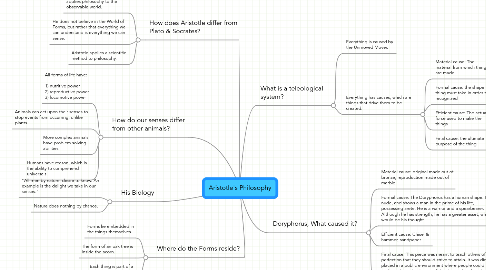Aristotle's Philosophy
by Michelle Hoang


1. His Biology
1.1. "All men by nature, desire to know. An example is the delight we take in our senses."
1.2. Nature does nothing by chance.
2. How do our senses differ from other animals?
2.1. All forms of life have: 1) nutritive power 2) reproductive power 3) locomotive power
2.2. Animals can act upon their senses to stop events from occurring, unlike plants.
2.3. More complex animals have problem solving abilities.
2.4. Humans have reason, which is the ability to comprehend universals.
3. How does Aristotle differ from Plato & Socrates?
3.1. Unlike Plato and Socrates, he applies philosophy to the observable world.
3.2. He does not believe in the World of Forms, but rather that everything we can understand is everything we can sense.
3.3. Aristotle applies a scientific method to philosophy.
4. Where do the Forms reside?
4.1. Forms lie embedded in the things themselves.
4.2. The form of an oak tree is inside the acorn.
4.3. Each thing is part of a goal oriented system.
5. What is a teleological system?
5.1. Everything is caused by the Unmoved Mover.
5.2. Everything has causes, which are things that drive them to be created.
5.2.1. Material cause: The material from which things are made
5.2.2. Formal cause: the shape or form a thing must take in order to be recognized
5.2.3. Efficient cause: The actual force used to make the things
5.2.4. Final cause: the ultimate purpose of the thing
